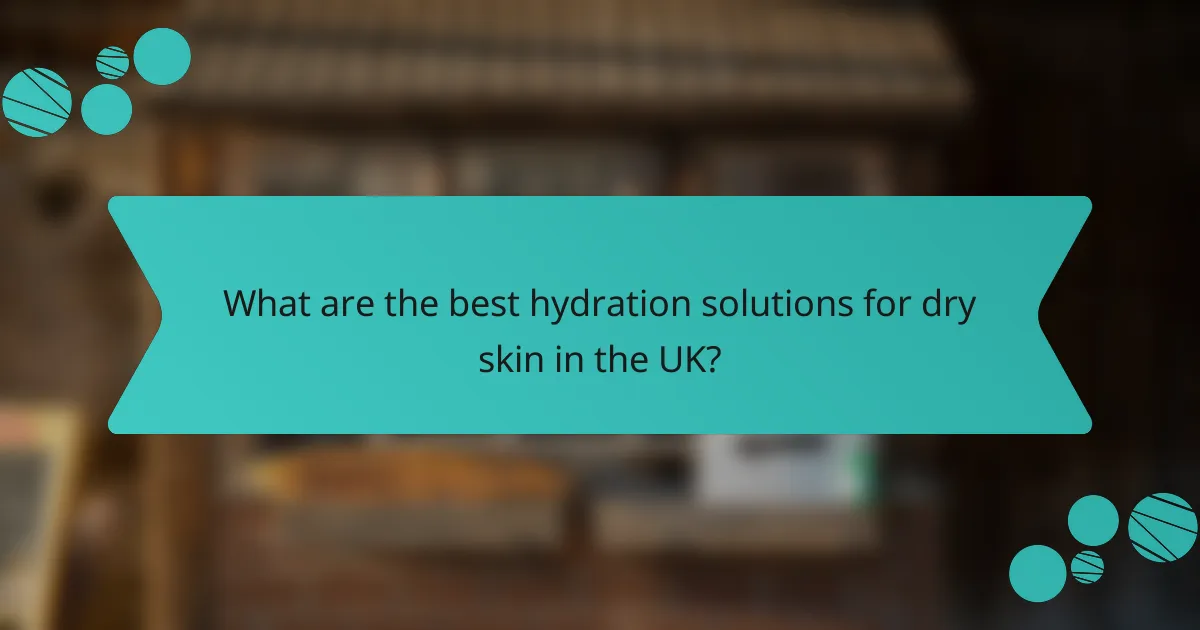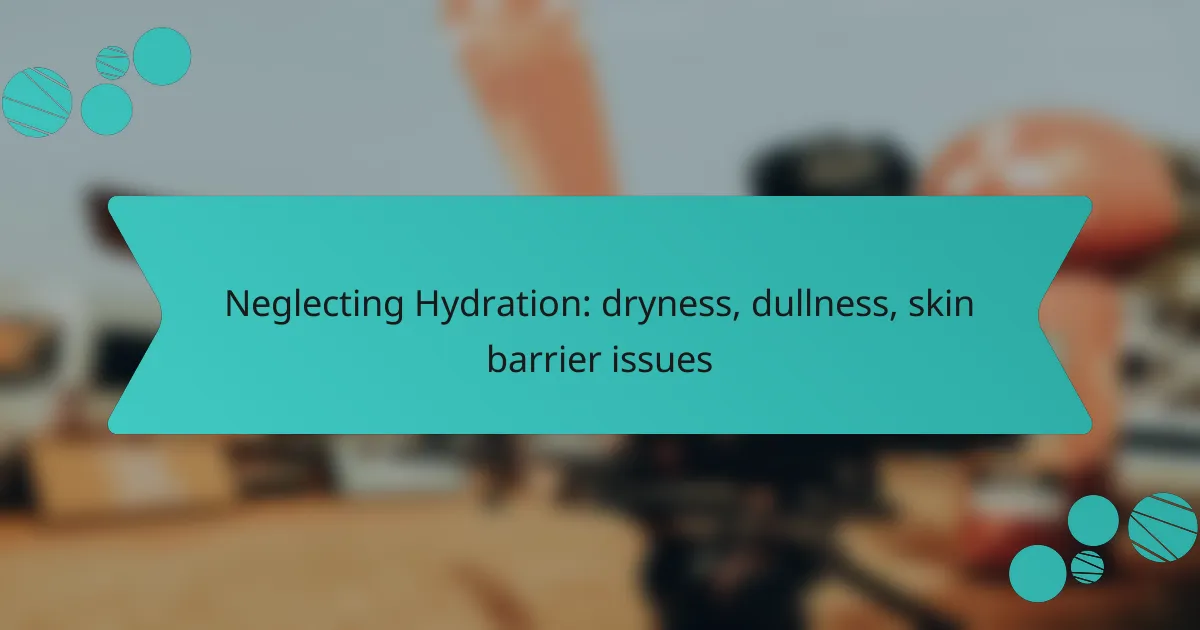Neglecting hydration can have detrimental effects on your skin, resulting in dryness, dullness, and weakened skin barriers. Proper hydration is crucial for maintaining skin elasticity and radiance, helping to protect against environmental stressors. Recognizing the signs of dehydration, such as increased sensitivity and rough texture, is the first step toward restoring your skin’s health and vitality.

What are the best hydration solutions for dry skin in the UK?
The best hydration solutions for dry skin in the UK include moisturizers with hyaluronic acid, hydrating serums from The Ordinary, using humidifiers, and ensuring adequate daily water intake. These methods work together to restore moisture, improve skin texture, and support the skin barrier.
Moisturizers with hyaluronic acid
Moisturizers containing hyaluronic acid are effective for dry skin as they attract and retain moisture. This ingredient can hold up to 1,000 times its weight in water, making it a powerful hydrator.
When selecting a moisturizer, look for products that list hyaluronic acid high on the ingredient list. Apply it on damp skin to maximize absorption and lock in moisture.
Hydrating serums from The Ordinary
The Ordinary offers a range of hydrating serums that are beneficial for dry skin. Their formulations often include ingredients like hyaluronic acid and glycerin, which help to boost hydration levels.
Consider using these serums before your moisturizer for enhanced hydration. Apply a few drops to clean skin, allowing it to absorb fully before layering on your moisturizer.
Humidifiers for indoor air
Using a humidifier can significantly improve skin hydration, especially during the colder months when indoor air tends to be dry. A humidifier adds moisture to the air, which can help prevent skin from becoming parched.
Choose a humidifier that suits your space, and aim for a humidity level between 30% and 50%. Regularly clean the device to prevent mold and bacteria buildup.
Drinking adequate water daily
Staying hydrated by drinking enough water is essential for maintaining skin moisture. Aim for at least 1.5 to 2 liters of water daily, adjusting based on activity level and climate.
Incorporate hydrating foods like fruits and vegetables into your diet as well. This holistic approach supports overall skin health and helps combat dryness from within.

How does neglecting hydration affect skin health?
Neglecting hydration can significantly impair skin health, leading to various issues such as dryness, dullness, and compromised skin barriers. Proper hydration is essential for maintaining skin elasticity, radiance, and overall resilience against environmental stressors.
Causes dryness and flakiness
When the skin lacks adequate hydration, it can become dry and flaky. This occurs because moisture is essential for maintaining the skin’s natural oils, which help to lock in hydration. Without sufficient water, the skin can lose its ability to retain moisture, leading to a rough texture and visible flakes.
Common causes of dryness include environmental factors like low humidity, excessive sun exposure, and harsh skincare products. To combat dryness, consider using a humidifier indoors and opting for gentle, hydrating cleansers and moisturizers that support the skin’s moisture barrier.
Leads to dull complexion
A lack of hydration can result in a dull complexion, as dehydrated skin often appears lifeless and lacks the natural glow associated with well-hydrated skin. When skin cells do not receive enough moisture, they can become sluggish, leading to a buildup of dead skin cells on the surface.
To improve skin radiance, incorporate hydrating serums or creams containing ingredients like hyaluronic acid or glycerin. Regular exfoliation can also help remove dead skin cells, allowing for better absorption of hydrating products and a more luminous appearance.
Contributes to skin barrier dysfunction
Neglecting hydration can compromise the skin barrier, which serves as a protective shield against irritants and pathogens. A weakened barrier can lead to increased sensitivity, redness, and a higher risk of skin conditions such as eczema or dermatitis.
To maintain a healthy skin barrier, prioritize hydration through both internal and external means. Drink plenty of water daily and use moisturizers that contain ceramides or fatty acids to reinforce the barrier and prevent moisture loss. Avoid over-cleansing, which can strip the skin of its natural oils and exacerbate barrier dysfunction.

What are the signs of dehydration in skin?
Signs of dehydration in skin include increased sensitivity, visible fine lines, and rough texture. These indicators suggest that the skin lacks adequate moisture, which can lead to various skin barrier issues.
Increased sensitivity and irritation
Dehydrated skin often becomes more sensitive and prone to irritation. This can manifest as redness, itching, or a burning sensation, particularly after using certain skincare products. Individuals may notice that their skin reacts negatively to previously tolerated ingredients.
To mitigate sensitivity, consider using gentle, hydrating products free from alcohol and fragrances. Look for ingredients like hyaluronic acid or glycerin, which help retain moisture without causing irritation.
Visible fine lines and wrinkles
When skin is dehydrated, fine lines and wrinkles can become more pronounced. This occurs because lack of moisture reduces skin elasticity, making it appear less plump. Dehydration can accentuate existing lines, especially around the eyes and mouth.
To combat this, incorporate a rich moisturizer into your routine that contains occlusive agents, such as shea butter or ceramides, to lock in hydration. Regularly applying sunscreen can also prevent further damage and maintain skin health.
Rough texture and uneven tone
Dehydration can lead to a rough skin texture and uneven tone, making the complexion look dull and lifeless. The skin may feel dry and flaky, which can hinder the natural glow and smoothness of the surface.
Exfoliation can help improve texture by removing dead skin cells, but it should be done gently to avoid further irritation. Pair exfoliation with hydrating serums or masks to restore moisture and promote a more even skin tone.

How can I improve my skin barrier function?
Improving your skin barrier function involves using specific products and practices that enhance moisture retention and protect against environmental stressors. Key strategies include incorporating ceramide-rich products, antioxidants, and avoiding harsh cleansers.
Use of ceramide-rich products
Ceramides are lipids that help form the skin’s protective barrier, retaining moisture and preventing dryness. Look for creams and lotions that list ceramides high on the ingredient list, as these will be more effective in replenishing your skin’s natural barrier.
When selecting ceramide-rich products, consider formulations that also include other beneficial ingredients, such as fatty acids and cholesterol, to enhance their effectiveness. Regular use can lead to improved hydration and a reduction in skin irritation over time.
Incorporating antioxidants like vitamin C
Antioxidants, particularly vitamin C, play a crucial role in protecting the skin barrier from oxidative stress and environmental damage. Vitamin C helps to brighten the skin and improve its overall texture while supporting collagen production.
To incorporate vitamin C into your routine, look for serums or creams with stable formulations. Apply these products in the morning before sunscreen to maximize their protective benefits against UV damage.
Avoiding harsh cleansers
Harsh cleansers can strip the skin of its natural oils, leading to dryness and compromised barrier function. Opt for gentle, sulfate-free cleansers that maintain the skin’s pH balance and preserve moisture.
When cleansing, avoid hot water and limit washing to once or twice a day. This approach helps to keep the skin barrier intact and reduces the risk of irritation and dryness.

What lifestyle changes can enhance skin hydration?
To enhance skin hydration, focus on adopting a balanced diet, staying active, and maintaining proper skincare routines. These lifestyle changes can significantly improve skin moisture levels, reduce dryness, and support the skin barrier.
Balanced diet rich in omega-3 fatty acids
A balanced diet that includes omega-3 fatty acids can greatly benefit skin hydration. Foods such as fatty fish (like salmon and mackerel), walnuts, and flaxseeds are excellent sources of these essential fats, which help maintain skin’s lipid barrier and prevent moisture loss.
Incorporating these foods into your meals can lead to improved skin texture and reduced dryness. Aim for at least two servings of fatty fish per week or consider a high-quality fish oil supplement if you have dietary restrictions.
Regular exercise for improved circulation
Regular exercise enhances circulation, which is crucial for delivering nutrients and oxygen to the skin. Activities like jogging, swimming, or even brisk walking can promote blood flow, helping to keep the skin hydrated and vibrant.
Try to engage in moderate exercise for at least 150 minutes each week. Remember to hydrate before, during, and after workouts to replenish lost fluids and support overall skin health.
